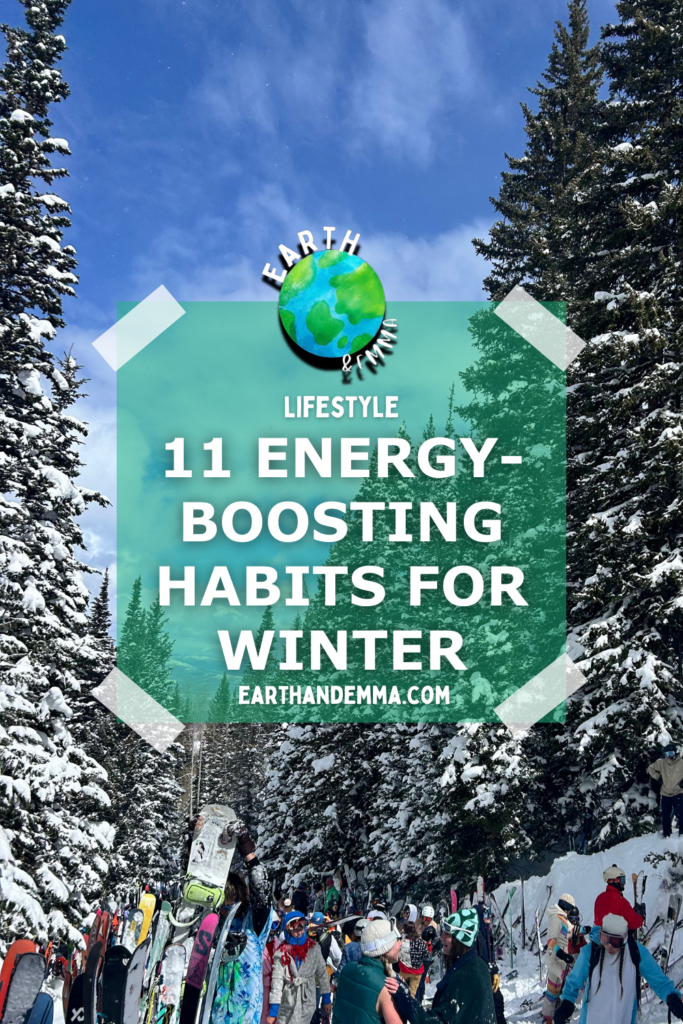
When the seasons change and the days get shorter, it’s easy for our energy levels to drop with the sun and leave us feeling low. Many can experience high energy byproducts in the sunny seasons and assume increased sun exposure alone is responsible. Summer is a high-energy season – there’s more sunshine, local produce options, and social activities; but is the sun itself the sole provider of our higher energy and happiness levels?
Many people experience seasonal depression, sickness, and lack of motivation in the darker and cooler seasons. Is the lack of sun the sole reason for these symptoms? We do indeed need direct sunlight exposure to produce our vitamin D, which increases the feel-good hormone serotonin, but our mood is a lot more complex than vitamin D production; thus, what determines our energy levels is equally complex. Our energy sources can be quite abundant, and if you are intentional about your habits, darker days don’t have to dictate your mood or how you choose to show up.
11 Daily Energy-Boosting Habits
- Eat local produce
- Drink water with salt
- No phone in the bookends of your day
- Spend 5 minutes outside when you wake
- Move in the morning
- Sync your life to your cycle
- Cut out toxicity
- Ditch the noise
- Practice meditation, strengthen your mind
- Put your thoughts on paper
- Breathe
1. Eat local produce
Food is arguably our most important energy source. Our food’s quality determines the performance of multiple anatomies and activities, so you are essentially what you eat. Our gut and brain are directly intertwined, so what we put into our bodies directly impacts our brain’s performance. Furthermore, the quality of those ingredients determines how our bodies can use them as energy for performance. Processed foods and artificial ingredients are all active toxins in our bodies. Not only does our gut reject them as food, but it has to fight to provide your brain and body with the energy and focus they deserve, but it will fail—more on this in habit #6.
Eating real food rather than processed ingredients will change your life. It can be a slow process to begin swapping out packaged foods for fruits, whole grains, beans, and vegetables, but the results you reap will help encourage you to stay on track. This can feel like a lifestyle change for some if you consume a highly processed diet. Check out your local farmers’ markets and add their schedules to your calendar so you can be sure to attend. Farmers’ markets provide the most nutritious and delicious produce options delivered with fewer emissions than grocery store produce and can often even be cheaper. I treat farmers’ markets like grocery stores because I live in California and can find a farmers market near me almost every day, and I’ve learned that buying produce from farmers can be cheaper than the grocery store; talk about a win win win!
2. Drink water with salt
We all know to hydrate throughout the day, but are you getting your electrolytes in? Electrolytes help you absorb your water and hydrate your body. Don’t waste your money on electrolyte drinks with harmful and unnecessary ingredients because adding a good quality salt to your water is the only electrolyte you need. I try adding salt to my water at least once a day, but if I get an intense workout in or have been sweating more than usual, I drink a few more.
3. Start and end your day without your phone
So, I don’t sleep with my phone in my room. I leave it in another room, and I am an all-around better person than I would be if I slept with my phone by my bed. I know this because of the positive differences I noticed right away when I started this habit. My bedroom has been a phone-free zone for so long that bringing my phone into my bed would be pretty weird. Our brains are super susceptive at the beginning and end of the day, so our phones do extra harm at these times than they normally would.
On the flip, these bookend times of day are great opportunities to read, journal, learn a language, or engage in some of your hobbies. It can be challenging to break this phone habit, especially since phones and most apps are designed to be addictive. If you’re someone who goes on your phone in bed, ask yourself why you do this and if it’s bringing you any value. If you need to buy a cheap alarm clock to break the phone-in-bed use cycle, do it already. Phones are energy suckers, and it’s time to stop falling victim.
4. Get outside ASAP in the morning
When I wake up, the first light I see is the sun. Our brain needs exposure to morning light to help regulate our circadian rhythms, and getting outside after waking up and sitting in the fresh air or going for a walk is all you need to do. How long do you need to be outside? Mel Robbins suggests 5 minutes if it’s sunny, 10 if it’s gloomy, and 20 if it’s raining (just find some head coverage so you don’t get dumped on). Leaving your phone out of the picture while your brain is adjusting to the new day. It also helps lower cortisol levels, which reduces stress and thus increases happiness. It’s also a good habit to open your windows and curtains to let some fresh air in when you wake up.
5. Movement in the morning
I used to roll out of bed straight into a mini morning walk, but that only works for me if I’m in a place where I feel comfortable walking around in my pajamas. Lately, instead, I’ve been diving straight into my morning yoga. I find that when I wake up, my brain all over the place but going through an intuitive yoga flow collects my thoughts and eases me into the day. I combine habit #4 with this one just by doing my yoga outside. Getting fresh air and light while slowly moving your body as your mind is waking up is a recipe for a calm headspace. If you don’t have an outdoor space to stretch, doing yoga in your home is great, just make sure to find a place for habit #4.
If you can get your workout for the day in the morning, that’s even better! Morning movement lets your mind and body connect and get on the same page. This relationship will catalyze the goals you can accomplish, and you’ll feel the momentum from your workout carry throughout the day.
6. Cycle Sync
This is a whole topic on its own, but it’s changed my life. Cycle syncing helps regulate your hormones and better manage your energy. By knowing what phase of my cycle I’m in, I’m better able to understand my feelings and behavior. It’s easy to get frustrated and beat yourself up for feeling off if you aren’t aware of the symptoms of your cycle season. Knowing the natural symptoms for the phases of your cycle helps you honor activities or tasks that better suit your season.
7. Cut Out Toxicity
I’ve been learning about many additives and oils in most processed foods in the US, and I’ve slowly been cutting all of them out. Some chemicals in our foods are directly linked to diseases, cancer, hormone imbalances, and other health issues in the long term. In the short term, they result in grogginess, irritability, and fatigue. Some even worsen the symptoms of neurodivergence and hyperactivity in ADHD. “Everything in moderation” used to make sense to me, but now even a small amount of something with these harmful symptoms isn’t worth it to me. I now see these foods as toxic, and toxic things are not welcome in my life. Not all processed foods are toxic, so if you’re worried about cutting some of your favorite snacks, I’m sure you can find alternatives, but your focus is best spent on getting in as many whole foods as possible.
Other forms of toxicity I don’t like to have in my daily life, if I can control them, are lousy energy people, harmful media, and certain household and beauty products. Your diet is a compilation of all of these things: what you eat, the media you see, who you spend time with, etc., so if multiple of those things are energy-sucking or toxic, that can wreak havoc on your well-being. Swap them for energizing foods and people, and watch your life change! I am on a new detoxifying mission and happy to share more about my findings and implementations here and on my socials.
8. Free your mind
I used to be the girl who had something playing in the background at all times. My Spotify minutes listened to per year was like 200,000 or something crazy like that. I was honestly scared to change my habit, I wanted something on for everything I was doing, I even had specific spotify playlists for different genres of books I was reading. Wild.
Now, I’m the opposite. Sometimes, I like to go for a little walk with headphones on, listening to a podcast or audiobook and giving it most of my attention. However, most of the time, when I’m doing work, walking my dog, and sometimes even driving, I do so in silence. Tapping into the silence releases the thoughts in my head, giving them an opportunity to unravel while also giving my mind a break from the constant input of information it experiences.
Silence has become so important to me because it connects me to my world. If we’re always plugged in and allowing a part of ourselves to be disconnected from the reality that is ours, we don’t know our world as well as we could. Unplugging will also help you fall asleep at night and leave you more energized in the mornings. Knowing our world turns to noticing, appreciating, and loving it. Loving our world can make our daily life just that much happier. Find a balance that works for you.
9. Meditation
Gaining tools to rein in your mind will help you focus when you want to. It takes a lot of mental energy to wade back and forth from tasks, so learning how to stay on task will make you feel more energized. A short morning meditation, or any time of day that works for you, will help ground your day and build that focus muscle.
10. Journal
Having a space to unload your mind and gain clarity on little wars in your head will help you tremendously. I like to start and end my day with my journal, but there’s no perfect time or way to journal. Find what works for you and how spending journaling can improve your life. Putting my thoughts on a page instead of letting them swirl around and marinate throughout the day clears up my mind and lifts a mental weight off my shoulders. If I’m not entirely sure what I would benefit most from journaling about, I open a page and let my mind wander, then expand on those thoughts. Journaling will leave you feeling lighter and more energized.
11. Breath check-ins
With ADHD and everything that comes with it, sometimes I’ll forget to breathe. Out of nowhere, I’ll realize I’ve been holding my breath in, and I won’t know for how long. I started checking in with my breathing and body throughout the day to see if I was holding tension or even my breath. I don’t do so visually but rather by scanning my body for discomfort. Sometimes, I need to uncross my legs, unclench my jaw, roll out my neck, or get up and take a walk to feel a release. The more I did this, the more I noticed patterns that caused the stressors, and in turn, I’ve been able to work on eliminating the sources.
Momentum is key to implementing healthy habits. Our health is key to a happier and longer life. I hope implementing these habits helps you regain your energy this winter!




Thank you. There is so much to digest in this but I am gonna make some changes and slow down tonight
Yeah reading a bunch of self-help tips can definitely feel like biting off more than one can chew at once. Even trying one thing to change, and building from there is such a great way to show up for yourself!